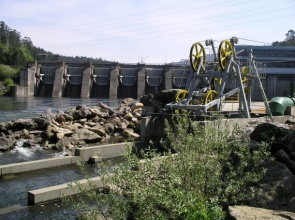Case study:International recovery of the river Minho: an example of sustainable hydraulic exploitation: Difference between revisions
SFW Nikhil (talk | contribs) No edit summary |
No edit summary |
||
| Line 12: | Line 12: | ||
{{Project overview | {{Project overview | ||
|Status=Complete | |Status=Complete | ||
|Themes=Fisheries, Habitat and biodiversity, Hydromorphology | |||
|Country=Spain | |Country=Spain | ||
|Main contact forename=Maria Luisa | |Main contact forename=Maria Luisa | ||
| Line 17: | Line 18: | ||
|Contact organisation=Unión Fenosa Generación | |Contact organisation=Unión Fenosa Generación | ||
|Multi-site=No | |Multi-site=No | ||
|Project picture=039 Rio Mino.jpg | |||
|Project summary=The situation of the Frieira dam is at about 68 Km from the flow into the river Miño in the Atlantic Ocean and constitutes the first transverse obstacle for the movement of the migratory fish. Until the construction of the dam, it was only crossed by a limited number of eels that were crossed by a small scale of poor efficiency. The rest of the migratory species (Atlantic salmon, sea trout or reo, lamprey, alosa and sábalo) saw their reproductive migration water up stopped, being out of their reach the traditional spawn zones. | |Project summary=The situation of the Frieira dam is at about 68 Km from the flow into the river Miño in the Atlantic Ocean and constitutes the first transverse obstacle for the movement of the migratory fish. Until the construction of the dam, it was only crossed by a limited number of eels that were crossed by a small scale of poor efficiency. The rest of the migratory species (Atlantic salmon, sea trout or reo, lamprey, alosa and sábalo) saw their reproductive migration water up stopped, being out of their reach the traditional spawn zones. | ||
With the execution of this project it is being trying to correct the environment impact produced by the exploitation of the Frieira installations, reinstituting the free circulation of the migratory fish water up the storage dam; In this way, it has been recuperated for these populations courses of the basin that were used for the reproduction and breeding before the dam construction. | With the execution of this project it is being trying to correct the environment impact produced by the exploitation of the Frieira installations, reinstituting the free circulation of the migratory fish water up the storage dam; In this way, it has been recuperated for these populations courses of the basin that were used for the reproduction and breeding before the dam construction. | ||
This project counts with the support of local, regional, national and European institutions. The financing comes from the LIFE initiative and the Government of Galicia. The total budget is 1.278.875€ (LIFE support 291.342€). | This project counts with the support of local, regional, national and European institutions. The financing comes from the LIFE initiative and the Government of Galicia. The total budget is 1.278.875€ (LIFE support 291.342€). | ||
}} | }} | ||
{{Image gallery}} | {{Image gallery}} | ||
Revision as of 09:11, 29 September 2014
This case study is pending approval by a RiverWiki administrator.
Project overview
| Status | Complete |
|---|---|
| Project web site | |
| Themes | Fisheries, Habitat and biodiversity, Hydromorphology |
| Country | Spain |
| Main contact forename | Maria Luisa |
| Main contact surname | Prada Hervella |
| Main contact user ID | |
| Contact organisation | Unión Fenosa Generación |
| Contact organisation web site | |
| Partner organisations | |
| Parent multi-site project | |
| This is a parent project encompassing the following projects |
No |
Project summary
The situation of the Frieira dam is at about 68 Km from the flow into the river Miño in the Atlantic Ocean and constitutes the first transverse obstacle for the movement of the migratory fish. Until the construction of the dam, it was only crossed by a limited number of eels that were crossed by a small scale of poor efficiency. The rest of the migratory species (Atlantic salmon, sea trout or reo, lamprey, alosa and sábalo) saw their reproductive migration water up stopped, being out of their reach the traditional spawn zones.
With the execution of this project it is being trying to correct the environment impact produced by the exploitation of the Frieira installations, reinstituting the free circulation of the migratory fish water up the storage dam; In this way, it has been recuperated for these populations courses of the basin that were used for the reproduction and breeding before the dam construction.
This project counts with the support of local, regional, national and European institutions. The financing comes from the LIFE initiative and the Government of Galicia. The total budget is 1.278.875€ (LIFE support 291.342€).
Monitoring surveys and results
Lessons learnt
Image gallery
|
Catchment and subcatchmentSelect a catchment/subcatchment
Catchment
Subcatchment
Site
Project background
Cost for project phases
Reasons for river restoration
Measures
MonitoringHydromorphological quality elements
Biological quality elements
Physico-chemical quality elements
Any other monitoring, e.g. social, economic
Monitoring documents
Additional documents and videos
Additional links and references
Supplementary InformationEdit Supplementary Information
| |||||||||||||||||||||||||||||||||||||||||||||||||||||||||||||||||||||||||||||||||||||||||||||||||||||||||||||||||||||||||||||||||||||||||||||||||||||||||||||||||||||||||||||||||||||||||||||||||||||||||||||||






